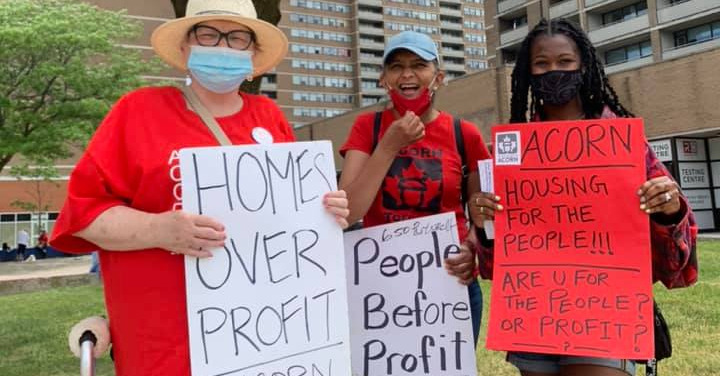Doug Ford’s More Homes Built Faster Act (Bill 23) destroys cities’ powers to build & protect real affordable housing!
Posted October 26, 2022
ACORN calls for scrapping Bill 23 that will ignore the needs of the most vulnerable.
Yesterday, the Doug Ford government announced the More Homes, Built Faster Act that claims to be among the “new solutions” in tackling the housing crisis in Ontario. Headline – 1.5 million homes in 10 years! However, in the process of introducing a slew of legislative changes to build these unaffordable homes, the Ford government is taking away the powers cities currently have to build any real affordable housing by overriding measures cities have/are undertaking to protect tenants from renovictions/demovictions and build/and protect existing affordable housing.
Building more unaffordable housing.
The Act aims to build 1.5 million homes in the next 10 years. However, building more unaffordable housing is not the solution to the housing crisis. Ontario needs affordable housing and not more of luxury condos.
Cities will have no power to build real affordable housing.
Inclusionary Zoning (IZ) allows cities to mandate a certain percentage of new developments to be set aside as affordable. Currently, cities have some powers to legislate their own IZ bylaws and build some real affordable housing. Ford already limited these powers back when the PC government was elected in 2018 by limiting IZ units to major transit areas. Now, this legislation goes a step further by taking away any powers cities have in drafting their IZ policies.
- 5% set aside rate for affordable housing units. Only 5% of the IZ units or Gross Floor Area of a new development will be set aside as affordable. This is extremely low given the extent of the housing crisis. Data shows that each year in Canada, 64,000 existing affordable housing units are lost — 20,000 in Ontario alone. IZ has been implemented in several cities in Canada and the US, and studies show the best set-aside rates are 20-30%. ACORN members and allies won IZ bylaws in Toronto and Mississauga with set aside rates of upto 16% for affordable rental units and upto 22% for affordable ownership phased over years.
- The units will be kept affordable for a maximum of 25 years. Ontario is in a chronic housing crisis. There are massive incentives for landlords to up the rent once a tenant vacates the unit. After 25 years, the affordable housing unit will return to the market and the tenants will lose their affordable housing and communities. For IZ policies to be effective, the IZ units need to be kept affordable forever! ACORN members and allies won these changes in Toronto and Mississauga, but those gains will be lost.
- The definition of affordable housing will be based on 80% Average Market Rent (AMR). CMHC defines housing as affordable only if the rent is no more than 30% of the household income. In today’s rental market, 80% of AMR is NOT affordable. The City of Toronto recently revised its definition of affordable housing, basing it on household income and not average market rent.
It will make tenants more vulnerable to renovictions/demovictions, increase homelessness crisis and destroy existing affordable housing by weakening or eliminating rental replacement bylaws across cities.
In Ontario, landlords are increasingly using renovation/demolition as a tactic to evict tenants so that once the tenant moves out, they are able to substantially jack up the rent. ACORN has been fighting in many cities such as Toronto, Ottawa and Hamilton where cities have already started drafting strong tenant relocation and anti-renoviction policies.
However, Doug Ford wants to take that power away from the cities to build more unaffordable housing to address the issues of aging, energy inefficient rental housing stock. Building more energy efficient, new housing at the cost of low- and moderate income tenants is not a solution to the housing crisis. We can’t meet carbon emission targets at the expense of low income affordability! To do this, Ontario will launch consultations to standardize municipal by-laws.
Further, the Bill strips the tenants’ right to return in case of demolition or conversion to condos. This is extremely disturbing since it will destroy existing affordable housing and accelerate evictions and homelessness crisis since the new units will be out of rent control.
As per the data by the City of Toronto, over the last 5 years, the City’s rental replacement policy framework has secured the replacement and renewal of almost 2,200 private market existing rental units. The existing rental replacement policies act as a major deterrent for landlords to demolish apartment buildings as this will require them to build replacement rental units. However, if Bill 23 is approved, these rental replacement policy frameworks will not exist placing thousands of affordable housing units in jeopardy.
More, not less tenant protections in case of renovations/demolitions is the answer!
Other issues
Further, other things that this legislation proposes to do is exempt new developments, including affordable housing, from development charges. ACORN members are wary of this because in the absence of these charges, costs for important services such as transit and other city services will not be met.
It also reducing the capacity of conservation authorities in the process of building more housing.
In short, the new legislation is destructive and works to the detriment of low- and moderate-income tenants. It undoes a lot of changes ACORN members are fighting for and have won that would create real affordable housing and protect existing affordable housing.
This proposed legislation undermines low and moderate income tenants who are in desperate need of support.

